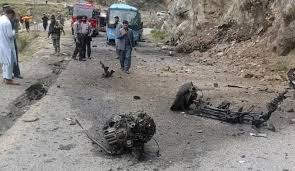
At least 12 Pakistan Army soldiers were killed in a suicide car bomb attack in the Khyber Pakhtunkhwa province on Tuesday night. The attack took place when a suicide bomber rammed an explosive-laden vehicle into a joint checkpost in the Malikhel area, located in the Bannu district.
According to the Pakistan Army’s media wing, Inter Services Public Relations (ISPR), the terrorists attempted to breach the joint checkpost but were initially thwarted by the security forces stationed at the site. Despite their efforts to infiltrate the post, the suicide blast led to the collapse of part of the perimeter wall and caused significant damage to the surrounding infrastructure.
The ISPR confirmed that the blast resulted in the deaths of 12 security personnel, including 10 Pakistan Army soldiers and two members of the Frontier Constabulary. Six terrorists were reportedly killed in the subsequent gunbattle with the troops.
Local reports indicate that the injured soldiers were promptly taken to a nearby hospital for medical treatment. The Hafiz Gul Bahadur faction, a breakaway group of the Pakistani Taliban, claimed responsibility for the attack, calling it a retaliation against the Pakistani government’s military operations in the region.
The ISPR statement confirmed that a sanitization operation is ongoing in the area, and the Pakistan Army has vowed to bring the perpetrators of this attack to justice.
The attack in Khyber Pakhtunkhwa comes at a time of escalating violence in Pakistan, particularly in the Balochistan and Khyber Pakhtunkhwa provinces. Earlier this month, a suicide bombing at a railway station in Quetta killed 25 people, including 14 Pakistan Army soldiers. The Center for Research and Security Studies (CRSS) has reported a significant surge in terror-related violence, with a 90 percent increase in attacks across the country during the third quarter of 2024.
In response to the growing security threats, Pakistani Prime Minister Shehbaz Sharif announced a new military offensive in Balochistan to tackle separatist movements and secure key infrastructure projects in the region, which include critical Chinese Belt and Road initiatives.
Authorities have vowed to intensify efforts to combat terrorism, but the violence in the region continues to pose a significant challenge to the security forces and civilian populations.
Sources By Agencies


